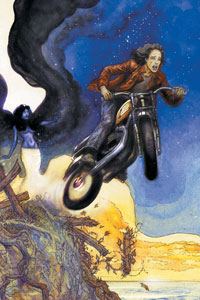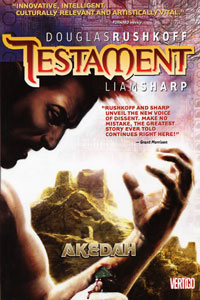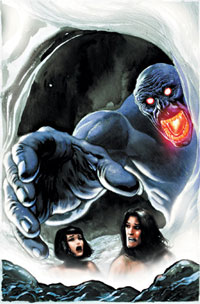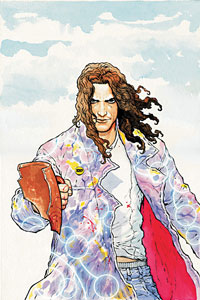Comics /
Spotlight /
Religion and Comics
Bible Comics: Testament
By Beth Davies-Stofka
August 18, 2009 - 19:15
The descendants of Abraham, Ishmael, and Isaac – Jews, Christians, and Muslims – share a great deal in worldview and morality, captured in their scriptures and beliefs. One of the most fundamental assumptions of the religions of Abraham is that God does not act alone in the world. Humans are God's cohort, possessing a genuine and active role in creating a life that will reflect God's intentions. Indeed, Abraham's children may argue bitterly amongst themselves about those precise intentions! But they generally agree that humans are expected to behave morally, and assist in advancing God's plan.
Roughly 20 stories about Abraham are gathered in the first book of the Bible, Genesis. We find Abraham in chapters 11-25. Abraham's faithfulness is central to these tales. He does not play a passive role in a drama determined by God's will and word. What Abraham does and says has an effect on what happens in the future. This is why the God of the book of Genesis does not have absolute foreknowledge of the future. The actions of human beings make a difference to God.
The stories of Abraham recounted in Genesis form the parallel history for the first few issues of Vertigo's
Testament, collected in Volume 1: Akedah.
Testament was a comic book that asked the question: “What if the stories of the Bible were happening today?” Part of the answer is that now, as then, people will fight for freedom and justice, regardless of the strength of their enemies. The characteristic belief of the Bible and Qur'an is that justice will finally prevail, because of the power of faith.
Whose justice and whose faith? You may need to read
Testament to draw your own conclusions. I think that Rushkoff's primary concern is to show the younger generations (those who can't trust anyone over 30) that their destiny is firmly in their own hands. What they create is entirely their own choice. In Rushkoff's hands, the central theses of Genesis are anti-authoritarian and anti-doctrinal. They are the source code of creation, and those who know that code can alter it. Maybe even write APIs for it. It's a sort of Biblical cyberpunk.
The first issues of
Testament were concerned in large part with the story told in Genesis 14. Genesis 14 tells of how five kings from Canaan rebelled against four eastern kings who had subjugated them. In the ensuing war, the four kings from the East defeated the five rebellious kings, and took their property and people. Among the five rebellious kings were the kings of Sodom and Gomorrah, implying that Abraham's nephew Lot, who lived at Sodom, was also taken captive. A survivor of the battle escaped and told Abraham that his nephew had been taken hostage. So Abraham and his allies chased the four eastern kings, utterly defeated them, and brought the captured people and property home to Canaan.
How did Abraham and his allies succeed in defeating four powerful allies, when the five allied kings of Canaan could not? The difference-maker was Abraham's God, El Elyon, the Most High God. When Abraham returned to Canaan, he was met by the king of Sodom, and by Melchizedek, the king of Salem. Melchizedek blessed Abraham, saying, "Blessed be Abraham by God Most High, maker of heaven and earth; and blessed be God Most High, who has delivered your enemies into your hand!" (Genesis 14:19-20) Of course Abraham was a formidably talented military leader, but it was his faithfulness in his God that made it possible for him to rescue the captives.
In the Bible, this story is relatively simple, but in
Testament, it becomes a dramatic tale in which Abraham and his allies fight supernatural giants called Anakim, legendary creatures of rabbinical tradition, who are in the service of the god Moloch and the goddess Astarte. Their Canaanite captives are grabbed from their cages and eaten alive by the Anakim. Astarte says she will use her giants to kill Abraham and his God. But Abraham rallies his troops, promising, "No giant is greater than our God."
When Abraham engages the Anakim in battle, Melchizedek (transformed by Rushkoff and Sharp into a divine representative of the One True God) blesses them, saying, "May you appear to them as big as your faith in the Lord." And by the power of faith, Abraham and his army grow until they are even larger than the Anakim. The battle is a rout. When Astarte commands Moloch to strengthen the Anakim, Moloch tells her, "I am spent. The Anakim are too fearful." The faith of Abraham easily defeats the frightened giants, and the captives are freed.
 |
Rushkoff and Sharp move back and forth between this ancient battle, and a parallel story located in the near future. Abraham's contemporary counterpart, Dr. Alan Stern, receives news from the survivors of an attack on a peace rally that his son Jake has been taken captive by a secret department of the Pentagon. Dr. Stern does not hesitate to set out to free his son, even though Jake is held in a secret government facility and the soldiers have been given orders to shoot anything that moves.
Instead of Anakim, Stern and Jake's friends confront giant robots, part of a military program called "Project Anakim." Stern hacks the robots, and sends them away to tear down the facility in which the hostages are being kept. Stern doesn't see what the reader does: the hand of Melchizedek, reaching from outside of time, to activate Stern's hacking protocol. "Then as now," Melchizedek says, "faith rules the day."
Like Abraham did so long ago, Stern also rallies his troops, (his son's young friends), telling them not to be afraid. "They use your work against you," he tells them. "But if it's really your work, you always have a way to control it. That's the difference. You always stay connected to what you truly create." Abraham is conscious of his God, but Stern is not. But both are conscious of their connection to creation, and they understand how this makes their actions meaningful. They understand that what they do makes a difference.
In the Bible, humans have an active role to play in reclaiming the world from its oppressors. And thanks to the Bible, we have an idea of the divine strategy. Men and women will face the powers of war and destruction with faith, and faith will bring down giants. In creating
Testament, Rushkoff aimed to bring this ancient thesis to life in a comic book, turning young readers on to the source code of creation, letting them in on the great secret: that they hold the power to create the world in which they want to live.
"Do not be afraid!" these ancient Bible stories seem to say. "Your faith will set you free." As a meditation on the meaning of ancient scriptures,
Testament is a gem. It's a tough read, of course. It requires notes and annotations, and little pieces like this to help readers access its ideas. It was canceled, I believe, because the action unfolded too slowly, seemingly too attached to the Bible's own pacing (and the Bible is not known for its dramatic pacing). But
Testament is worth the time spent reading and studying it. What if Rushkoff's dream came true and we all rose up to wrest control of reality's substance from advertisers and spin doctors? We might actually find out what it means to be the change.
Rating: 8 /10
Last Updated: January 17, 2025 - 08:20



